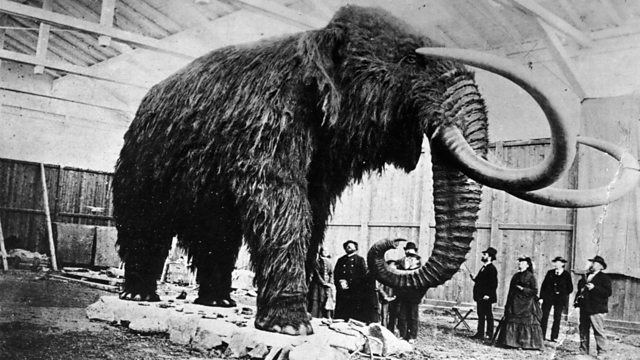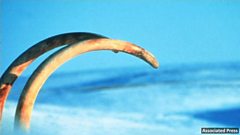Resurrection
What are the rights and wrongs of resurrecting the past? Can what’s dead and gone ever be returned to its former glory? With Beth Shapiro, Jyotsna Kalavar and Bill Smith.
Why we yearn to bring the past back to life, whether it is extinct animals, ancient languages or salvaging the wreckage of a legendary speedboat. Bridget Kendall asks the ancient DNA biologist Beth Shapiro, the Sanskrit expert Jyotsna Kalavar and the engineer Bill Smith to share their thoughts.
(Photo: A woolly mammoth. Credit: Getty Images)
Last on
More episodes
Previous
Clip
-
![]()
The oldest DNA recovered so far
Duration: 01:18
Chapters
-
Beth Shapiro
What would it take to resurrect a woolly mammoth?
Duration: 16:25
Jyotsna Kalavar
Rejuvenating one of the oldest languages in the world
Duration: 06:35
60 Second Idea
Revive yourself
Duration: 05:27
Bill Smith
The challenges of rebuilding an iconic machine
Duration: 12:03
Beth Shapiro
![Beth Shapiro]() Beth Shapiro specialises in the ancient DNA of two extinct species, the woolly mammoth and the passenger pigeon, and is associate Professor of Ecology and Evolutionary Biology at the University of California in Santa Cruz. She shares with us her latest research on de-extinction, which is the science of creating an organism which is a member of or resembles an extinct species. While it’s unlikely any extinct animal will be successfully brought back to life soon, Beth argues that resurrecting extinct traits can be a powerful new tool in biodiversity conservation. Beth’s latest book is .
Beth Shapiro specialises in the ancient DNA of two extinct species, the woolly mammoth and the passenger pigeon, and is associate Professor of Ecology and Evolutionary Biology at the University of California in Santa Cruz. She shares with us her latest research on de-extinction, which is the science of creating an organism which is a member of or resembles an extinct species. While it’s unlikely any extinct animal will be successfully brought back to life soon, Beth argues that resurrecting extinct traits can be a powerful new tool in biodiversity conservation. Beth’s latest book is .Jyotsna Kalavar
![Jyotsna Kalavar]() Jyotsna Kalavar is actively involved in the revival of Sanskrit as a spoken language in India and the United States, and has been a key contributor to Sanskrit education around the world. She is also a senior volunteer teacher. While Sanskrit has remained as a written and liturgical language throughout the centuries, the numbers of speakers has declined. Some of this has been attributed to the rise of English after colonialism, and also a change in the traditional educational system. Jyotsna speaks about the challenges of modernising a language that was created so long ago, and why it is worth preserving the ancient knowledge locked in its words. Jyotsna Kalavar is also Professor of Human Development and Family Studies at the New Kensington campus of Penn State University in the US.
Jyotsna Kalavar is actively involved in the revival of Sanskrit as a spoken language in India and the United States, and has been a key contributor to Sanskrit education around the world. She is also a senior volunteer teacher. While Sanskrit has remained as a written and liturgical language throughout the centuries, the numbers of speakers has declined. Some of this has been attributed to the rise of English after colonialism, and also a change in the traditional educational system. Jyotsna speaks about the challenges of modernising a language that was created so long ago, and why it is worth preserving the ancient knowledge locked in its words. Jyotsna Kalavar is also Professor of Human Development and Family Studies at the New Kensington campus of Penn State University in the US.Bill Smith
![Bill Smith]() Bill Smith is an engineer and salvage diver who is leading a project to restore one of the world's most legendary speedboats. It was more than 45 years ago that the racing driver Donald Campbell was killed in his boat the , in a spectacular crash while trying to increase the world water speed record to more than 300 miles an hour. Bill Smith was the diver who recovered the wreckage in 2001, and has since spent more than a decade restoring the boat so it can run at speed again. He explains to us the complications of rebuilding such a craft which had the engine of a jet powered hydroplane, and was considered a spectacular feat of engineering.
Bill Smith is an engineer and salvage diver who is leading a project to restore one of the world's most legendary speedboats. It was more than 45 years ago that the racing driver Donald Campbell was killed in his boat the , in a spectacular crash while trying to increase the world water speed record to more than 300 miles an hour. Bill Smith was the diver who recovered the wreckage in 2001, and has since spent more than a decade restoring the boat so it can run at speed again. He explains to us the complications of rebuilding such a craft which had the engine of a jet powered hydroplane, and was considered a spectacular feat of engineering.60 second Idea to Improve the World: revive your life
![60 second Idea to Improve the World: revive your life]() In our Sixty Second Idea to improve the world, the Sanskrit specialist Professor Jyotsna Kalavar suggests having a sofa or chair that can be remote controlled to make the occupant stand. The sofa represents passivity, and by making the sitter stand upright it would encourage efforts to revive oneself, move forward and be energetic.
In our Sixty Second Idea to improve the world, the Sanskrit specialist Professor Jyotsna Kalavar suggests having a sofa or chair that can be remote controlled to make the occupant stand. The sofa represents passivity, and by making the sitter stand upright it would encourage efforts to revive oneself, move forward and be energetic.Broadcasts
- Mon 1 Jun 2015 01:05GMTΒι¶ΉΤΌΕΔ World Service Online
- Tue 2 Jun 2015 08:05GMTΒι¶ΉΤΌΕΔ World Service Online
Podcast
-
![]()
The Forum
The programme that explains the present by exploring the past







